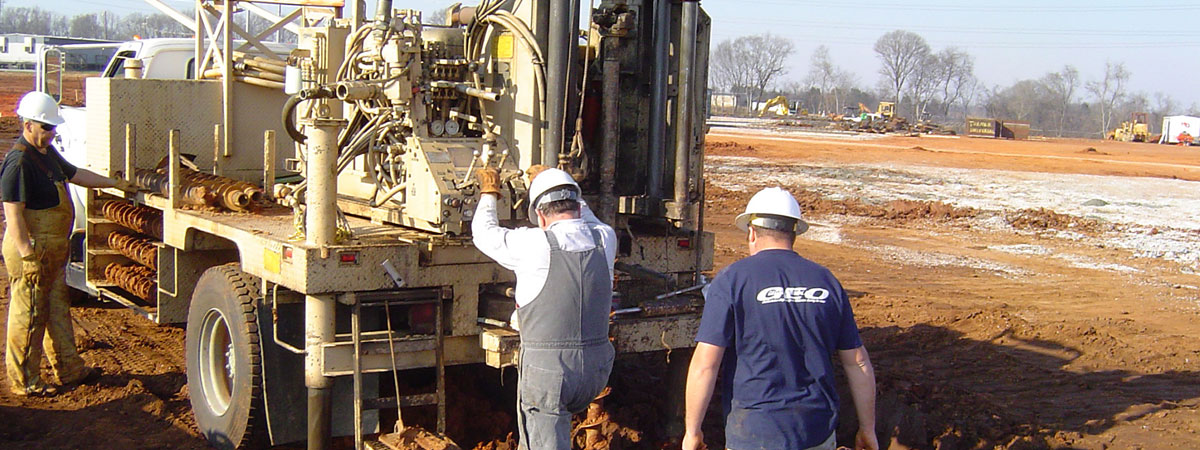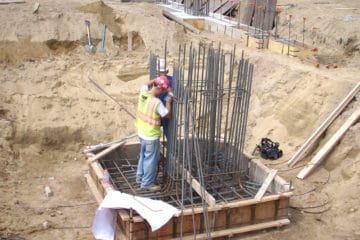Top Geotechnical Engineers for Cutting-Edge Soil Evaluation and Structure Design
Top Geotechnical Engineers for Cutting-Edge Soil Evaluation and Structure Design
Blog Article
Recognizing the Essential Role of the Geotechnical Market in Modern Building And Construction Projects and Facilities Development
The geotechnical industry is a cornerstone of contemporary building and construction and framework growth, providing crucial understandings right into soil behavior that directly influence job end results. Via advanced soil evaluations and innovative engineering services, geotechnical specialists not only make certain structural honesty however additionally address sustainability problems in the middle of evolving ecological standards.
Importance of Dirt Analysis
Dirt assessment plays an important duty in the geotechnical sector, working as the foundation for educated decision-making in building and construction tasks. Precise soil evaluation is important for establishing the suitability of a site for different types of frameworks, including domestic homes, business structures, and bridges. By evaluating soil structure, strength, density, and wetness web content, designers can anticipate prospective challenges and alleviate threats related to ground instability, disintegration, and negotiation.
The evaluation process generally entails a series of examinations and observations that offer vital details about the subsurface problems. This information notifies the style and building processes, guaranteeing that frameworks are improved solid ground with appropriate support. In addition, recognizing the dirt account allows designers to select ideal construction techniques and materials, maximizing source utilization and minimizing prices.
Along with making certain architectural stability, soil analysis adds to ecological sustainability. By recognizing prospective contamination or damaging effects on surrounding ecological communities, designers can implement strategies to safeguard these natural sources. Overall, extensive dirt assessment is crucial in the geotechnical field, underpinning the security, performance, and ecological duty of building jobs.
Key Geotechnical Techniques
A variety of crucial geotechnical strategies are employed to examine and boost the security and performance of construction sites. One fundamental approach is dirt tasting and screening, which enables engineers to determine the chemical and physical residential or commercial properties of the ground. This details is important for making educated decisions relating to foundation style and building methods.
One more important strategy is website characterization, which involves the comprehensive assessment of soil and rock problems via approaches such as borehole boring and in-situ screening. Methods like Standard Infiltration Tests (SPT) and Cone Penetration Examinations (CPT) provide useful data on dirt strength and stratigraphy.
Ground improvement strategies, such as dirt stabilization and grouting, are additionally important in improving the load-bearing capacity of weak dirts. These techniques can mitigate settlement and improve overall website conditions.
Additionally, slope security analysis is essential for recognizing potential landslide dangers and making certain the security of excavations. This analysis usually uses numerical modeling and limit stability approaches to anticipate dirt actions under various problems.
Incorporating these geotechnical techniques right into building and construction planning not just enhances job end results however likewise makes certain the long-term sustainability of facilities development.
Effect On Construction Security

In addition, efficient geotechnical engineering involves applying mitigation techniques for recognized risks. This might include dirt stablizing methods, keeping structures, or water drainage systems to alleviate hydrostatic stress. By resolving these elements, building teams can reduce the chance of mishaps and enhance worker security.
Furthermore, continual surveillance of site conditions is critical during construction. Geotechnical informative post tools can give real-time information pertaining to ground motion and stability, enabling prompt interventions when needed.
Basically, the geotechnical sector plays a pivotal role in securing construction projects. By focusing on ground stability and utilizing extensive evaluation methods, the geotechnical industry not just secures the workforce but likewise adds to the long life and integrity of constructed infrastructure.
Sustainability in Geotechnical Practices

Moreover, geotechnical engineers are now using innovative modern technologies, such as geosynthetics, which enhance dirt security while minimizing the quantity of material called for. This not only preserves resources yet likewise results in much less waste generation (consulting engineer). The assimilation of lasting design principles right into geotechnical engineering motivates making use of sustainable power sources in building processes, additionally minimizing carbon emissions
By performing these analyses, geotechnical specialists can create strategies that reduce unfavorable results, making sure compliance with ecological policies. Overall, the emphasis on sustainability within geotechnical techniques not just contributes to the long life and durability of framework however likewise promotes an accountable technique to land and source management.
Future Trends in Geotechnical Engineering
Development is driving the future of geotechnical engineering, as arising techniques and innovations reshape the sector. The combination of sophisticated data analytics and expert system is readied to transform website investigation and threat evaluation, making it possible for engineers to make even more educated choices based upon real-time information. The use of geosynthetic materials is getting grip, providing lasting services that improve dirt security and minimize environmental impact - geo tech engineer.
One more substantial trend is the fostering of automated and robot systems for tracking and building procedures. These modern technologies not just improve precision yet additionally improve security by decreasing human involvement in dangerous settings. Additionally, the execution of Building Information Modeling (BIM) in geotechnical design promotes enhanced partnership pop over to this web-site amongst stakeholders, enhancing project distribution and decreasing costs.
As climate adjustment postures new obstacles, the market is progressively concentrating on strength and flexibility in style techniques, ensuring facilities can withstand severe climate occasions. Finally, the recurring pattern towards sustainability will certainly drive innovation in eco-friendly products and approaches, aligning geotechnical engineering with more comprehensive environmental objectives. Collectively, these fads will click here for info certainly shape an extra effective, lasting, and durable geotechnical landscape for future projects.
Conclusion

The geotechnical market is a cornerstone of modern construction and facilities growth, giving essential understandings into dirt habits that straight affect project end results. geo tech engineer.Soil evaluation plays an essential role in the geotechnical industry, offering as the structure for informed decision-making in building jobs. Overall, complete dirt analysis is vital in the geotechnical area, underpinning the security, performance, and environmental obligation of construction projects
Building safety is dramatically influenced by geotechnical practices, as the stability and integrity of the ground directly influence the overall security of a building website.In verdict, the geotechnical sector is vital in contemporary construction and infrastructure growth, providing important assessments that make sure architectural integrity and security.
Report this page